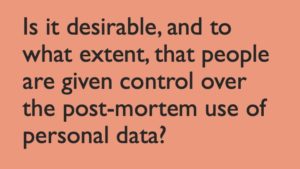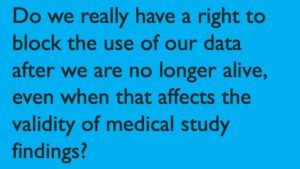by Marieke Bak, MSc, MA, PhD(c)
When people die nowadays, they no longer leave behind only physical assets. Their estate includes large amounts of personal data that remain in existence after they pass away. Creating a digital will may be a sensible way to posthumously control digital assets like Facebook pages or Google search histories. However, a recent survey found that the vast majority of us never discuss what should happen to our data after death.
When it comes to medical data, particularly those collected in the context of research, the situation is similar. Studies have shown that the majority of medical research registries and biobanks do not address post-mortem use of participants’ data (see for instance this international review of over fifty informed consent documents). Yet, given the growing number of long-term medical studies—and the increase in genomic studies which may affect living blood relatives—the question of what to do with the data when a research participant passes away is becoming ever more timely.
 International ethical guidelines are limited in detail and do not provide conclusive answers to this question. Most guidance documents only address the use of biological samples, and not data as such, or merely discuss the use of anonymised data from the deceased, even though anonymization turns out to be impossible in practice and moreover does not solve group-level ethical problems.
International ethical guidelines are limited in detail and do not provide conclusive answers to this question. Most guidance documents only address the use of biological samples, and not data as such, or merely discuss the use of anonymised data from the deceased, even though anonymization turns out to be impossible in practice and moreover does not solve group-level ethical problems.
Binding legal regulation is also of little help in the matter since most privacy laws (such as the new EU General Data Protection Regulation, see Recital 27) do not apply to deceased persons. A number of EU member states have independently enacted post-mortem data protection legislation to allow control by relatives. Some countries may also have specific legislation regarding medical research that includes the use of data after death and that applies alongside data protection regulation.
There are few empirical studies about perspectives regarding post-mortem use of research participants’ data as is evident from our own research. The topic is discussed mostly in the context of genetic research, where the stakes are highest given the implications for living blood relatives who share part of the deceased person’s genetic code. Relatives may have privacy and discrimination concerns, and may be the subject of clinically actionable DNA findings affecting their own health. However, the focus on these genetic findings (not further discussed here) obscures the question whether participants should have ‘post-mortem informational self-determination’ as such.
Lack of information about the fate of their data after death raises two ethical concerns. First, from a deontological (or duty-based) perspective, information privacy can be seen as valuable in itself because it creates the possibility for autonomous choice. Providing information about research uses after death is therefore a way to respect participants’ autonomy and sense of personhood.
Second, there is a consequentialist (or results-based) point about harm. Whether the dead themselves can be harmed is still a topic of lively philosophical debate. It is clear, however, that blood relatives who were unaware that their deceased loved one’s data is posthumously used without consent, may be distressed by such use and they may experience privacy concerns if the data says something about them too.
There can also be indirect harm for future patients. The rise of big data and the introduction of the GDPR in Europe have heightened interest in personal privacy. As we have seen from stories such as the Alder Hey organ retention scandal, transparency is needed for maintaining public trust in science. Not informing people about post-mortem data uses could, in a somewhat futuristic scenario, lead to mistrust. A lack of public trust harms science, if it means that people decide not to share their data posthumously.
Research by my colleagues and me shows that rather than being reluctant, the majority of research participants and their relatives support the continued use of data after death. This support mainly stems from a desire to help future patients. One research participant that we interviewed stated that using data from the deceased may mean a lot to surviving relatives (parents, in this scenario):
“I imagine it feels very useless when your child passes away. So if something useful can be done with the data, I would think that is very important.”
The importance of these data for medical research – combined with the support among participants and the reduced possibility of harm from data breaches after death – provides an ethical imperative for the research use of data after death. However, whenever possible, researchers should make explicit what happens to people’s data in case of incapacity or death. They should do so during the initial informed consent talk in which the study is explained to potential research participants. This needs to be done in a sensitive manner.
 On the other hand, one might say that merely informing people is insufficient. Respect for autonomy could require granting participants (or their surviving relatives) control over their data after death. One of our interviewees stated:
On the other hand, one might say that merely informing people is insufficient. Respect for autonomy could require granting participants (or their surviving relatives) control over their data after death. One of our interviewees stated:
“Why do you ask consent from living persons for DNA but throw it out in the open for someone who has passed away? There should be no difference between that. (…) It is actually cheating, because that man or woman is not alive anymore. So you are dealing with that disrespectfully. Certainly for the one that has passed away, but also for the family.”
It seems to be an open question whether it is desirable, and to what extent, that people are given control over the post-mortem use of personal data. Do we really have a right to block the use of our data after we are no longer alive, even when that affects the validity of medical study findings? And if so, if we agree that people should have post-mortem self-determination, how can this be practically implemented?
One idea that has received some attention is the creation of posthumous medical data donation registries. In the proposed system, people are asked to indicate whether their data can be used post-mortem for research. While this approach promotes individual autonomy, there may be problems too. Compared to healthy individuals, patients are more likely to share their data for research. Asking people to register these preferences outside of a medical study context may lead to refusals. When many people refuse, the research results will suffer from selection bias and therefore become useless.
In order to prevent a move towards either over- or underprotection of personal data after death, there is a strong need for further legal and ethical guidance. Additional empirical studies, that include more diverse groups of participants, could also provide helpful insights.
This blog is based on findings of our ongoing empirical research and on our review paper published in September 2019, “Stakeholders’ perspectives on the post-mortem use of genetic and health-related data for research: a systematic review” in the European Journal of Human Genetics.